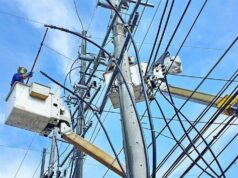EARNINGS of Cemex Holdings Philippines, Inc. (CHP) were cut by more than half in 2017, as higher cement volumes sold for the period failed to offset the continued drop in cement prices.
In a presentation to investors, the company said net income slowed by 65% to P659 million in 2017, against the P1.87 billion it recorded a year ago. Operating EBITDA (earnings before interest, taxation, depreciation, and amortization) also declined by 50.7% to P3.3 billion, compared to P6.7 billion in 2016.
“Lower prices was the main reason for the decrease, as well as higher fuel and distribution costs,” the company said.
Net sales for the period dropped by 10% to P21.78 million, prompted by a 10% decline in domestic cement prices.
Construction of infrastructure projects drove the demand for cement last year, particularly in the fourth quarter as CHP noted an acceleration of government approvals for such projects.
“In 2018, the rollout of several big-ticket infrastructure projects and the rehabilitation of Marawi City will continue to boost the sector,” the company said.
Demand from the residential sector meanwhile contracted in the fourth quarter of 2017, but CHP expects to see some recovery this year as the tax reform program boosts higher take home pay for Filipino workers.
“The sector’s growth will be supported by the income-boosting tax reform, remittances from overseas Filipino workers, and the government’s emphasis on affordable housing,” said the CHP.
2018 CAPEX
Amid the company’s lower performance in 2017, CHP is keeping a positive outlook on the Philippine’s construction industry as it allots P3.7 billion in capital expenditures this year.
“CHP remains positive on the prospects of Philippine construction, with expectations of sustained economic expansion in 2018,” CHP President and Chief Executive Officer Ignacio Mijares was quoted as saying in a statement.
The company is currently undertaking a $225-million expansion of its Solid Cement Plant in Antipolo, Rizal, and is now finalizing negotiations with suppliers and contractors. CHP looks to start the operations of a new line by the first quarter of 2020.
“We remain focused on executing our capacity expansion plan in Solid Cement Plant. In addition, we are undertaking efforts to de-bottleneck our operations, achieve higher customer service levels, and reduce costs to drive growth for our business,” Mr. Mijares said.
With this, the expansion of the Solid Cement plant will corner the bulk of CHP’s P3.7-billion capex, or P3 billion. The remaining P700 million will be spent for maintenance capex, while P40 million will be for strategic capex.
Incorporated in 2015, CHP supplies cement under the APO, Island, and Rizal brands. The company also has a ready-mix concrete product called Promptis which is sold in Metro Manila.
Shares in CHP were down by 1.21% or five centavos to finish at P4.08 apiece at the Philippine Stock Exchange on Friday. — Arra B. Francia



